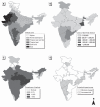Impacts of climate change on public health in India: future research directions
- PMID: 21273162
- PMCID: PMC3114809
- DOI: 10.1289/ehp.1003000
Impacts of climate change on public health in India: future research directions
Abstract
Background: Climate change and associated increases in climate variability will likely further exacerbate global health disparities. More research is needed, particularly in developing countries, to accurately predict the anticipated impacts and inform effective interventions.
Objectives: Building on the information presented at the 2009 Joint Indo-U.S. Workshop on Climate Change and Health in Goa, India, we reviewed relevant literature and data, addressed gaps in knowledge, and identified priorities and strategies for future research in India.
Discussion: The scope of the problem in India is enormous, based on the potential for climate change and variability to exacerbate endemic malaria, dengue, yellow fever, cholera, and chikungunya, as well as chronic diseases, particularly among the millions of people who already experience poor sanitation, pollution, malnutrition, and a shortage of drinking water. Ongoing efforts to study these risks were discussed but remain scant. A universal theme of the recommendations developed was the importance of improving the surveillance, monitoring, and integration of meteorological, environmental, geospatial, and health data while working in parallel to implement adaptation strategies.
Conclusions: It will be critical for India to invest in improvements in information infrastructure that are innovative and that promote interdisciplinary collaborations while embarking on adaptation strategies. This will require unprecedented levels of collaboration across diverse institutions in India and abroad. The data can be used in research on the likely impacts of climate change on health that reflect India's diverse climates and populations. Local human and technical capacities for risk communication and promoting adaptive behavior must also be enhanced.
Figures

References
-
- Agarwal R, Jayaraman G, Anand S, Marimuthu P. Assessing respiratory morbidity through pollution status and meteorological conditions for Delhi. Environ Monit Assess. 2006;114(1–3):489–504. - PubMed
-
- Ageep TB, Cox J, Hassan MM, Knols BGJ, Benedict MQ, Malcolm CA, et al. Spatial and temporal distribution of the malaria mosquito Anopheles arabiensis in northern Sudan: influence of environmental factors and implications for vector control. Malar J. 2009;8:123. doi: 10.1186/1475-2875-8-123. [Online 7 June 2009] - DOI - PMC - PubMed
-
- Agrawal A. Local institutions and adaptation to climate change. In: Mearns R, Norton A, editors. Social Dimensions of Climate Change: Equity and Vulnerability in a Warming World. Washington, DC: World Bank; 2009. pp. 173–198.
-
- Akhtar R, McMichael AJ. Rainfall and malaria outbreaks in western Rajasthan. Lancet. 1996;348:1457–1458. - PubMed
Publication types
MeSH terms
Grants and funding
LinkOut - more resources
Full Text Sources
Medical
Research Materials
